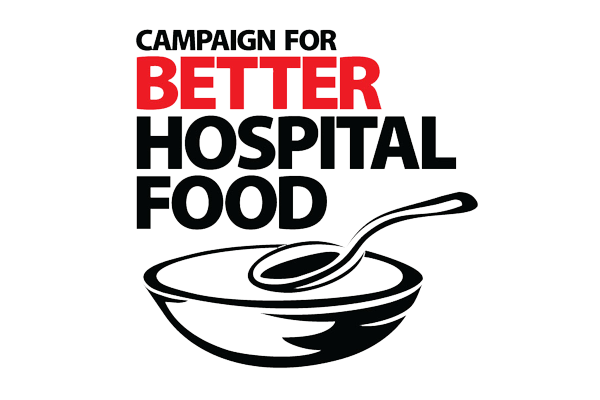Sustain • Better Hospital Food
Hospital food standards: The story so far
This page records the history of the Campaign for Better Hospital Food, showing the step-by-step progress over many years and key milestones in hospital food improvements. Sustain started work in earnest on enforceable public sector food standards back in 2008, after nearly a decade of running practical projects to show what is possible.
Hence, we also hope to illustrate just what persistence, detailed work and partnerships it takes to create and maintain an institutional culture of good food in the NHS.
We remain concerned that without legally binding standards, monitoring, training and a culture of valuing food, there will always be a downward pressure on catering budgets and food standards.
- What we want
- Why we want it
- Our progress so far
- Problems that persist
- Other relevant work by Sustain
Throughout this account, highlighted text provides links and references to the definitions, contractual requirements or other official documents tha contribute to hospital food standards. Most of these landmarks relate to hospitals in England, though some are UK-wide. There are additional and welcome initiatives to improve hospital food in Wales and Scotland, where procurement is a devolved matter.
What we want
We want the Westminster government to apply higher standards to hospital food so that it’s freshly cooked, nutritious and made with care by highly trained staff using the best healthy and sustainable ingredients. The government could easily do this by:
- Setting high quality standards for hospital food.
- Putting the standards into law.
- Getting the standards checked by an independent organisation trusted by patients, visitors and staff.
Why we want it
Patients and NHS staff report that hospital food is often unappetising, reheated from frozen, highly processed, low in fruit and veg and fibre and much of it goes uneaten. Facilities for preparing good food are limited, patients are not supported to eat well, and the food service is undervalued for its role in promoting health, well-being and providing good contracts to ethical food producers with public money.
Setting higher standards for hospital food, putting these standards into law and getting them independently monitored by an organisation trusted by staff and visitors would:
- Increase the number of freshly cooked meals served
- Reduce the amount of hospital food uneaten and going to waste
- Address malnutrition in our hosptials
- Reduce the recovery time for patients
- Save money by giving hospitals the purchasing power to buy their own ingredients from the best local suppliers and through collaborative procurement contracts
- Improve long-term health of hospital patients, staff and visitors
- Help tackle the human, animal and environmental damage caused by the role of intensive farming in the production of low-quality hospital food
To read more about the benefits of what we want to achieve, see our 'Taking the Pulse of Hospital Food; a survey of NHS hospitals using London as a test case' report and other publications.
Our progress so far
Sustain's Campaign for Better Hospital Food has worked over many years to drive up the quality, nutrition and sustainability of hospital food, as well as fighting to create health-promoting environments for NHS staff and visitors. For the majority of landmark improvements listed below, the Campaign for Better Hospital Food was instrumental in encouraging policy makers to take action, and in helping many people and organisations – from across the spectrum of groups affected by hospital food standards – to have their concerns and voices heard.
There is still a long way to go, but we have achieved some good progress on the journey so far. Here are some key landmarks, in reverse chronological order.
October 2020 - Hospital Food Review calls for legally-binding food standards and investment in kitchens
Sustain patron Prue Leith recommended a suite of changes to hospital food as part of an Independent Review of NHS Hospital Food which she headed up on behalf of the Government.
The review made eight key recommendations, including upgrading kitchens, enshrining standards for nutrition, sustainability and quality in law (as school food standards are already), and tightening up the monitoring of NHS food by empowering the Care Quality Commission to report on compliance. No new money was allocated to help hospitals enact the recommendations.
July 2020 - National Food Strategy Part One includes a commitment to improve public sector food
The newly published National Food Strategy: Part One includes a commitment to improve public sector procurement of food and drink. Henry Dimbleby, independent lead for the strategy, has promised to include a comprehensive recommendation in Part Two on what the government can do to ensure that the food the state pays for directly – including in hospitals – is both healthy and sustainable.
August 2019 - Doctors say hospital food does not promote a balanced diet for patients
The British Medical Association conducted a survey of its research panel of doctors across the UK on hospital food available for patients, staff and visitors. They found that doctors do not believe the food served to patients and staff; nor the food available for purchase by patients, staff and visitors in hospital concourses, promotes a healthy balanced diet. During night shifts, doctors felt particularly badly served, with the only food available to purchase often being unhealthy products from vending machines.
August 2019 - Government launches Hospital Food Review after food-poisoning outbreak
The Government launched a Hospital Food Review after a listeria food-poisoning outbreak in hospital sandwiches. The review was headed up by good food advocate and Sustain patron Prue Leith and Phil Shelley of the Hospital Caterers Association.
May 2019 - Government consults on healthy eating standards for public sector food, including hospitals
The government sought views on a proposal to update the government buying standards for food nutrition standards to reflect the latest official dietary advice. They proposed a new policy to ensure healthier food and drink options are available across the public sector.
April 2019 - Hospital staff say patient meals not fit to eat
More than half of hospital staff in England wouldn’t eat food served to patients because it’s unhealthy and of poor quality, according to a survey by the public sector union, UNISON.
- Half of respondents (50%) thought meals were neither nutritious nor good quality, while slightly more (53%) said they wouldn’t eat food prepared for patients.
- Another major concern was the lack of healthy, inexpensive food and drink options for employees. Nearly a third (32%) said on-site vending machines sold no nutritious snacks. Similar complaints were made of restaurants (16%) and shops (16%).
- More than one in ten (12%) said they had no access to free drinking water and more than a quarter (28%) that they could not buy food suitable for their diet or religion, such as vegetarian or halal options.
- Staff said that healthier foods, such as fruit, vegetables and low-fat, low-sugar choices, were hard to find at night despite almost a third (32%) of staff working shifts.
- Those who brought food from home (71%) to eat at work often found preparation facilities, such as microwaves and kitchens, fell short of expectations. Two in five (40%) rated these as “bad” and just over a quarter (26%) said they had no dedicated area to eat.
- The high cost of nutritious food at work was cited as the biggest barrier to eating healthily (61%).
March 2019 - Charities and public sector demand 'hardship fund' to prevent no deal Brexit food crisis
Sustain coordinated a joint appeal to the Prime Minister to provide:
- Clarity over accountability and powers to mitigate food disruption (to continuity of food supply and food prices).
- Clear communication on the challenges ahead, and plans to mitigate risks, including with local authorities and resilience teams, frontline charities and their networks, and public sector institutions.
- Crisis support and funding for regional and local government and resilience teams, and for public sector institutions, to ensure food supplies are guaranteed for those most in need.
The letter was co-signed by the Sustain, the National Association of Care Caterers, School Food Matters, Food for Life, Fareshare, the Trussell Trust, the Independent Food Aid Network, the Federation of Wholesale Distributors, and the Sustainable Food Cities network, among others.
The letter came in the same week as Sharon Hodgson MP called a Westminster Hall debate in Parliament to highlight the impact of no deal Brexit on food for public sector institutions such as schools, hospitals and care homes.
February 2018 – NHS England and NHS Improvement back calls for patient engagement
The Campaign for Better Hospital Food was pleased to receive letters of support from both NHS England and NHS Improvement, confirming the importance of the Campaign for Better Hospital Food’s ongoing role in raising standards in hospital food and reiterating the wish of both organisations to work in partnership with us to enable greater engagement in improving hospital food standards by patients, food and health specialists, caterers, doctors, nurses and other NHS staff.
The Campaign for Better Hospital Food draws up plans to roll out our model for mapping, monitoring, governance and patient engagement across the whole of England. We want to bring the voices of patients, NHS staff, medical experts and good food pioneers in the NHS to the fore nationwide, whilst maintaining pressure on hospitals to improve and on government to drive up standards. Our aim is threefold; to "raise the game" for food in hospitals- particularly for the half still not meeting even the baseline food standards that we have secured; to cultivate a "virtuous circle" of standards, measurement, engagement, feedback and improvement; and to shift culture and expectations towards healthier eating as a key factor in disease prevention and overall well-being.
January 2018 – Defra’s 25 Year Environment Plan commits hospitals to using the Balanced Scorecard
After long-term pressure from the Campaign, and others, we welcomed the assurances received from Defra that NHS hospitals, as Department of Health Government Agencies, should now use the Balanced Scorecard in their food and catering contract procurement.
“On page 89 of Defra’s 25 Year Environment Plan it states that: “Contracting parties – including food businesses and local authorities – are also guided by elements of the Plan for Public Procurement and Catering Services, including the ‘balanced scorecard’…”
“And follows on page 90 with a government commitment to: “Ensuring that as food and catering contracts come up for renewal, central government departments and their agencies adopt the balanced scorecard approach to deliver benefits to the environment, consumers and businesses alike.”
By phone, we were assured by a Defra press officer that the above statement means that NHS hospitals, as Department of Health Government Agencies, must now use the Balanced Scorecard in their food and catering contract procurement.
The Balanced Scorecard contains the same mandatory standards as the Government Buying Standards for Food and Catering Services (GBS, which Sustain advised on), which are required for all NHS Hospitals as part of the standard NHS contract (*see below) and cover nutrition as well as ethical and sustainable food buying. Indeed, many hospitals use the two documents interchangeably. From our perspective this move would therefore be a welcome clarification to the current rules that would further bolster compliance with the Government Buying Standards.
And bolstering is needed, as although all hospitals are required to meet Government Buying Standards, a Department of Health report published in January 2017 showed that only just over half (52 per cent) of NHS hospitals in England were actually meeting these Government Buying Standard (Balanced Scorecard) standards. Sustain’s own research report into London hospital food standards, called ‘Taking the Pulse’ found this national picture of non-compliance reflected across the London region.
* The requirement for NHS hospitals to meet Government Buying Standard is included in the Standard Contract for Hospitals Service Conditions, and a summary of the relevant section is below:
SC19 Food Standards
Food Standards:
19.3 When procuring and/or negotiating contractual arrangements through which any potential or existing tenant, sub-tenant, licensee, contractor, concessionaire or agent will be required… to adopt the full range of mandatory requirements in Government Buying Standards.”
January 2018 – Total ban on sale of sugary drinks written into hospital contracts
NHS England initially included a 10 per cent cap on the sale of sugary drinks on hospital sites by March 2018 as a new addition to its CQUIN health targets for hospital food providers. A CQUIN (Commissioning for Quality and innovation) is an incentive system for hospitals to improve on a range of outcomes. Since then, in response to pressure from our campaign and others, NHS England has toughened up this stance to a total ban on all sugary drinks sold in hospitals premises and has written this change into an updated NHS Standard Contract released in January 2018*(see below), coming into force in July 2018.
All hospitals were required to use this updated contract from February 2018 and must bring all food outlets trading on NHS hospital premises in England into line with the new rules when the time comes to renew their contracts. The Campaign for Better Hospital Food will maintain pressure to ensure that NHS England do not overturn this ban and so that hospitals and food outlets trading on NHS premises are aware of the ban and feel obliged to comply. We will also work to maintain the momentum begun by this campaign to keep the CQUIN standards tough and improving, and keep pressure on hospitals to meet these target standards.
Sales of Sugar-Sweetened Beverages
19.4 With effect from 1 July 2018, the Provider must not itself sell or offer for sale any Sugar-Sweetened Beverage at the Provider’s Premises.
19.5 The Provider must use all reasonable endeavours to ensure that, with effect from 1 July 2018, its tenants, sub-tenants, licensees, contractors, concessionaires and agents do not sell or offer for sale any Sugar-Sweetened Beverage at the Provider’s Premises.
19.6 The Provider must make it a condition of any relevant lease, licence, contract or concession agreement taking effect or varied on or after 1 July 2018 that the tenant (and any sub-tenant), licensee, contractor or concessionaire does not sell or offer for sale any Sugar-Sweetened Beverage at the Provider’s Premises on or after 1 July 2018
Link to NHS Standard Contract document
https://www.england.nhs.uk/wp-content/uploads/2018/01/2-nhs-standard-contract-1718-1819-service-conditions-full-length.pdf
(see SC19 Food Standards - 19.4)
December 2017 – Sugary drinks sales driven down across hospital sites, showing health targets a success
As a result of ongoing pressure from the Campaign for Better Hospital Food, and others, almost two thirds of hospitals now meet NHS England’s 2017-2019 Health and Wellbeing CQUIN target to reduce the sales of sugary drinks on hospital sites to 10 per cent of total sales.
October 2017 – Large chocolate bars and grab bags are banned from hospital sites
After pressure from the Campaign for Better Hospital Food, and others, NHS England has strengthened its Health and Wellbeing CQUIN targets for hospital caterers and retailers by banning large chocolate bars and grab bags of chocolate, that are over 250 calories, from sale on hospital sites. NHS England had already taken action to ban price promotions as well as the advertising of unhealthy foods – high in salt, fat or sugar – on NHS premises. Healthy options are supposed to be available at all times, for patients, visitors and staff, including those working night-shift. The Campaign for Better Hospital Food will work to maintain this pressure so that hospitals and food outlets trading on NHS premises are aware of the ban and feel obliged to comply.
April 2017 – NHS England set targets to cut sugary drinks sales in hospitals
We were delighted that NHS England heeded our call, and the calls of others, to reduce sugary drink sales in hospitals. NHS England announced a target for reductions. This measure covers all hot and cold sugary drinks, including added sugar fruit juices and milky drinks, served in cafés, vending machines and shops. Find out more, here: https://www.sustainweb.org/news/apr17_nhs_england_cut_sugary_drinks_sales_10_per_cent/
March 2017 – Sustain publishes the first in-depth study of hospital food policy and practice
This ground-breaking report was the first to survey NHS hospital food standards in 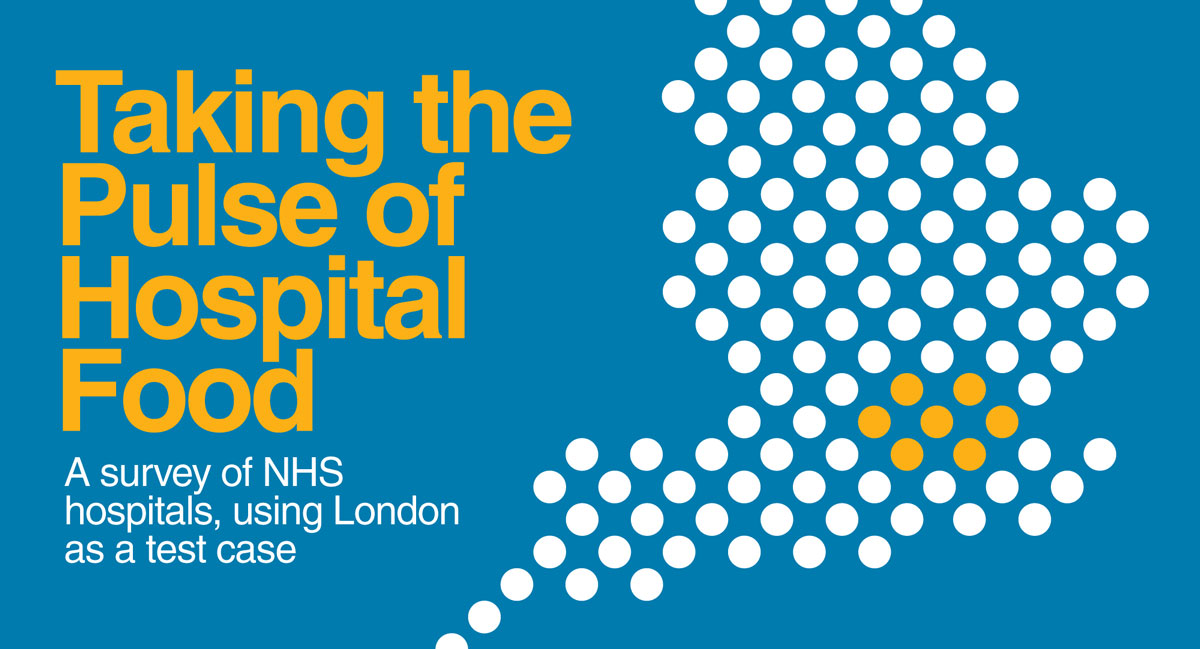 detail at the hospital level, across one geographical area. The Campaign for Better Hospital Food ‘Taking the Pulse’ report, mapped the quality of hospital food across London’s acute hospitals.
detail at the hospital level, across one geographical area. The Campaign for Better Hospital Food ‘Taking the Pulse’ report, mapped the quality of hospital food across London’s acute hospitals.
Thirty out of 39 of London’s acute hospitals responded to our detailed survey on hospital food standard and CQUIN target compliance and their food policy and practice. Twenty one individuals and organisations added their names as signatories in support of the report, including the College of Medicine; Faculty of Public Health; Medact; the public sector union Unison; Action on Salt and Sugar; Jamie Oliver’s Food Foundation. Data in the ‘Taking the Pulse’ report showed that half of London’s acute hospitals were failing to meet basic food standards, and nearly two thirds failing to cook fresh food for their patients.
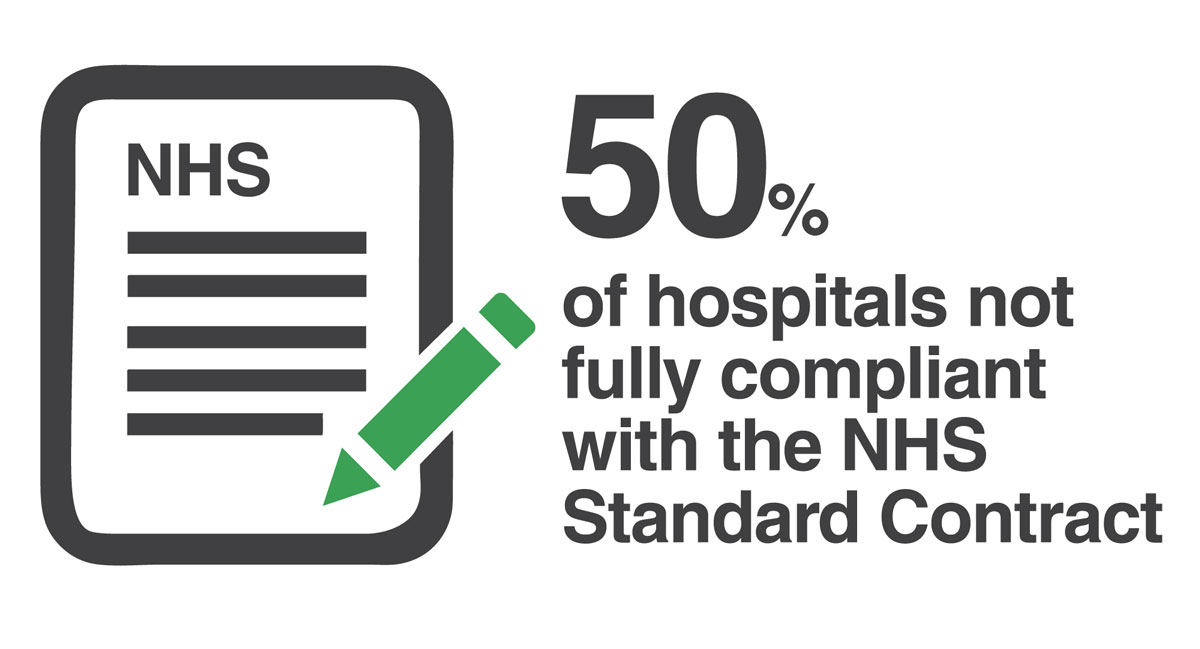
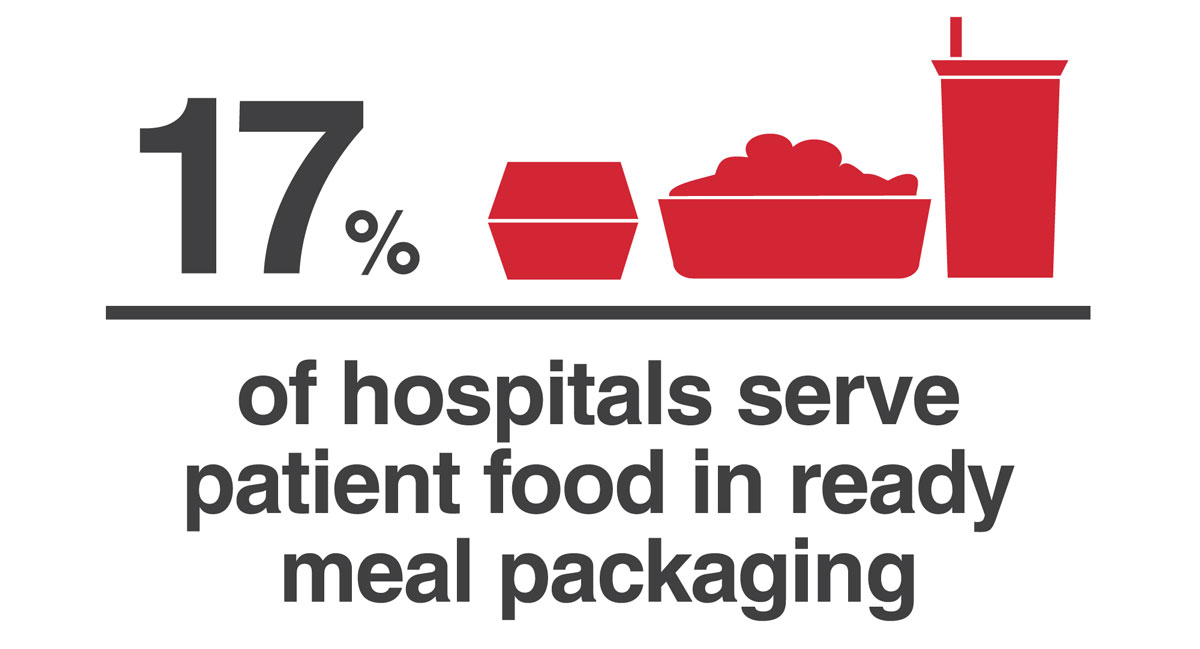
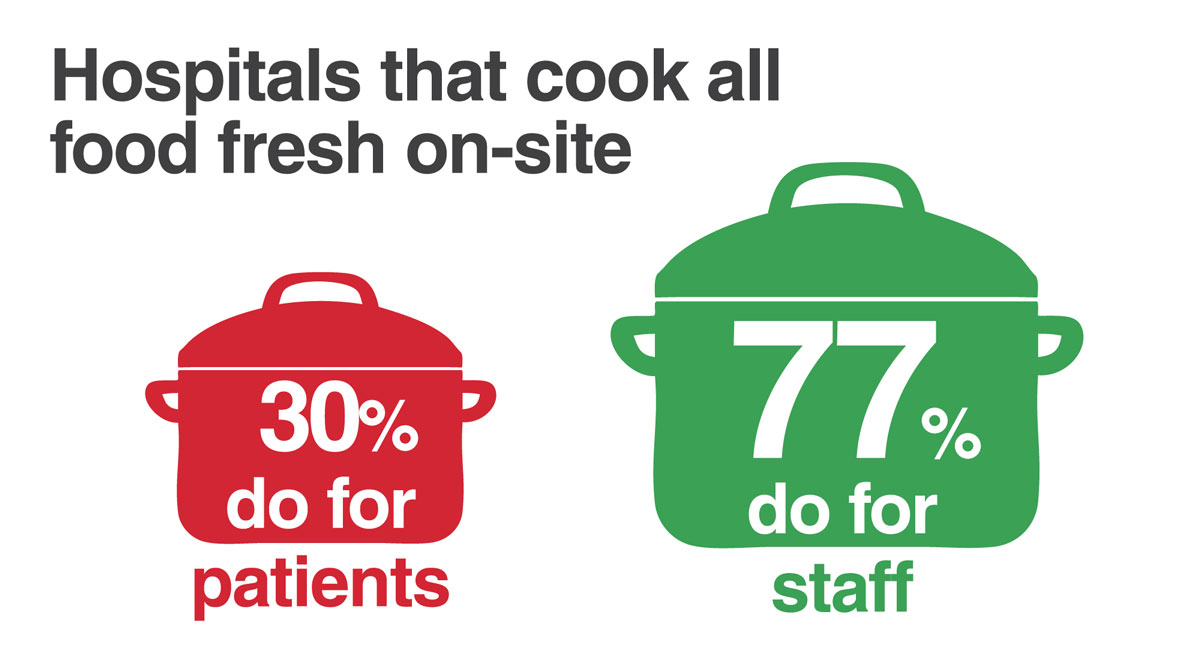
The report results, released on NHS Sustainability Day, showed many hospitals struggling to serve and sell freshly prepared, healthy and ethically sourced food for patients, staff and hospital visitors.
The foreword to the report was provided by our campaign ambassador Prue Leith, who noted:
“Hospital food has a deservedly poor reputation and NHS patients and staff deserve better. This report shows that at the moment most hospitals are not serving fresh, tasty and wholesome food so we must have legal standards, like those already in place for school food and prison food, to make sure good food is a priority in our hospitals.”
March 2017 – NHS England CQUIN standards are extended and expanded for 2017-2019
In response to public pressure and the success of the first CQUIN Health and Wellbeing targets, on which the Campaign for Better Hospital food advised, NHS England expanded and extended the Health and Wellbeing CQUIN for 2017-2019. This next food CQUIN demands hospitals (and retailers) meet the 2016-2017 targets but also demands reductions in the amount of high fat, salt and sugar (HFSS) foods and drinks available across the shop floor: https://www.england.nhs.uk/nhs-standard-contract/cquin/cquin-17-19/
February 2017 – Our campaign letter prompts Health Secretary Jeremy Hunt to commit to hospital food
Concern that responsibility for hospital food standards was being moved from the Department of Health to NHS Improvement (NHSI), before a team at NHSI was recruited to continue the work, led the Campaign for Better Hospital Food to write a letter with signatories from 15 campaigns and organisations to ask Simon Stevens, CEO of NHS England, and Jeremy Hunt, Secretary of State for Health, to commit to preserving and developing existing hospital food standards, and working towards increasing animal welfare and environmental sustainability. This letter prompted a firm commitment from Jeremy Hunt to continue to maintain standards in hospital food.
January 2017 – Department of Health finally publishes first dataset on hospital food standard compliance
The Campaign for Better Hospital Food, and others, have maintained the call for greater transparency on hospital food standards. In the latest step towards this goal, the Department of Health published data, just before the Hospital Food Standards Panel was disbanded, on the national picture of hospital compliance with the NHS Standard Contract hospital food standards that had been established by the Panel (on which Sustain and alliance colleagues served, see below).
Although this was not broken down by hospital or trust, we were able to see that just under half of hospitals in England were not meeting the hospital food standards that are required in the NHS Standard Contract. This was the first time that any data of this kind had been published and it provided the first hard evidence that hospital food did not meet official government standards almost half of the time. The argument for more detailed data on hospital food could now be made.
October 2016 – Our Hospital food league table pushes top retailers to meet NHS England health targets
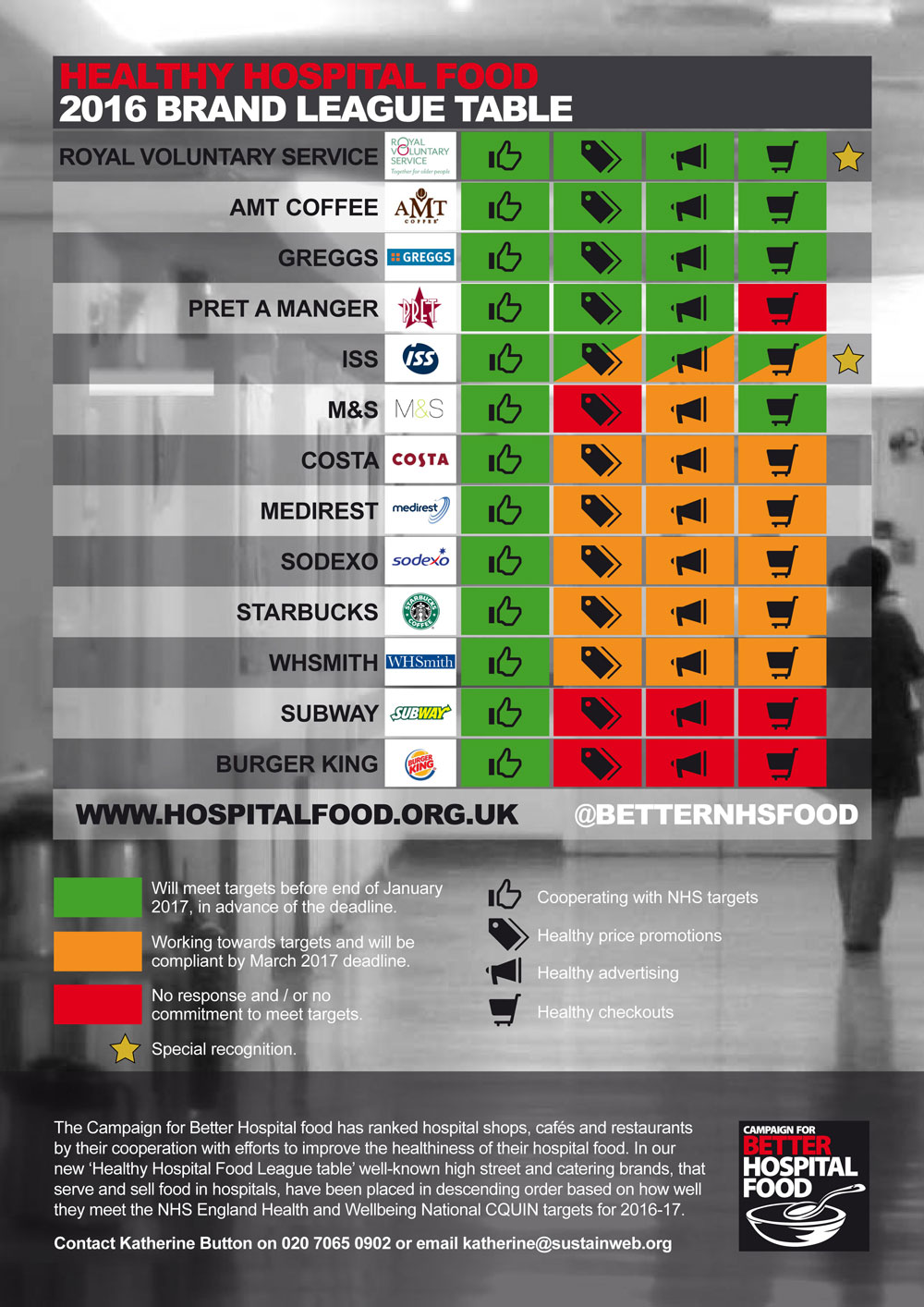 We published the Healthy Hospital Food League Table, to rank food retail and catering brands serving food on NHS hospital premises against the NHS England mandatory CQUIN standards for food. The process of researching and compiling the league table won several commitments from commercial food and retail companies and received lots of media and press coverage. The campaign achieved our aims of driving up NHS England Health and Wellbeing CQUIN target compliance amongst NHS catering and retail contractors by persuading more companies to commit to meeting the CQUIN targets than had previously signed up.
We published the Healthy Hospital Food League Table, to rank food retail and catering brands serving food on NHS hospital premises against the NHS England mandatory CQUIN standards for food. The process of researching and compiling the league table won several commitments from commercial food and retail companies and received lots of media and press coverage. The campaign achieved our aims of driving up NHS England Health and Wellbeing CQUIN target compliance amongst NHS catering and retail contractors by persuading more companies to commit to meeting the CQUIN targets than had previously signed up.
Nine brands committed to all of the targets, two committed to three out of four targets. Amongst these companies, M&S committed to meeting the targets on healthy check-outs and promotions, WHSmith committed to meet all the targets before the deadline, and catering company ISS committed to meeting the targets early across its own brand range and compelling private franchisees also to meet the targets by deadline. Costa and Starbucks committed to meet the CQUIN targets by the March 2017 deadline.
Significant media coverage kept the issue of commercial food outlets in hospitals on the public agenda and saw one journalist posing the question: ‘Should restaurants like Burger King be allowed into hospitals?’
April 2016 – We held the Healthier Food Procurement Workshop for hospital professionals
Our Healthier Food Procurement Workshop at London’s City Hall, hosted by Chair of the London Food Board Rosie Boycott, in partnership with Food For Life and Medact, was attended by hospital caterers, public health professionals and dietitians from NHS Trusts keen to learn and share knowledge. The headline speaker was a representative from NHS England who presented details of the new CQUIN Health and Wellbeing targets and explained that this would be part of a big push to improve hospital food over the coming two years. The workshop was designed to support cluster learning and knowledge sharing and was attended by delegates who are responsible for hospital catering and food retail, from catering managers and directors to dietitians and public health professionals.
January – March 2016 - NHS England enforces compulsory targets for hospital food for the first time
2016 began with a landmark achievement for the Campaign for Better Hospital Food - the launch of the NHS England health and Wellbeing CQUIN targets for hospitals. In January, Simon Stevens, chief executive of NHS England, attended a dinner hosted by the Campaign and campaign ambassador Prue Leith. Pioneering doctors, health specialists and nurses with concerns about diet-related health and hospital food also attended. The lively evening acted as a roundtable event, to outline to Simon Stevens the leadership action he could take to improve hospital food.
The following day, at his request, we drew up and sent Simon Stevens our ten practical recommendations for change. We recommended a new national mandatory NHS England CQUIN (Commissioning for Quality and Innovation) for food that would require all hospitals in England to improve their food standards. NHS England incorporated into the mandatory targets almost verbatim the guidance in the following four of our ten recommendations:
- Use national CQUINs to incentivise leadership in hospital food quality and compliance with food standards
- Establish a new CQUIN with a requirement for 24-hour healthy food provision for visitors and staff working shifts
- Tackle commercial food providers to provide a healthier food offer by introducing a sugary drinks tax
- Create better data on hospital catering contracts, how much the contracts are worth and when they expire and make this information available
Simon Stevens NHS England hit the headlines within days by committing NHS England to imposing a 20% sugar tax in hospitals and health centres around England, with the money raised being ring-fenced for hospital health improvement projects. See the BBC report at: http://www.bbc.co.uk/news/health-35340752. Sustain was already campaigning for a national sugary drinks tax, so this was a welcome boost to public debate and engagement with this important policy measure. Note that Chancellor of the Exchequer George Osborne announced a mandatory Soft Drinks Industry Levy in the 2016 Budget, with funds ring-fenced for children’s health, the levy coming into force by April 2018.
In February 2016, NHS England announced that such a CQUIN target would be put in place for the following financial year, 2016-2017, including some of our key recommendations: https://www.england.nhs.uk/2016/03/improve-staff-health/. Of special importance is that the CQUIN contains a mechanism to withhold some hospital funding for non-compliance with the healthy food targets. (Health and Wellbeing CQUIN details can be found at: https://www.england.nhs.uk/nhs-standard-contract/cquin/cquin-16-17/)
This was the first time that national targets and incentives had been used to drive up hospital food standards and the standards of commercial brands operating on NHS hospital premises So this was a major win for the Campaign for Better Hospital Food. To maximise the potential for improvement, we worked to raise awareness across the industry and challenged 13 well-known commercial retail brands that have a presence in hospitals to meet the targets in the 2016-2017 NHS England Health and Wellbeing CQUIN.
In August 2014, we helped to push the government into setting hospital food standards in England, for the first time
But despite this progress the standards that apply to hospital food are hopelessly weak, are not being properly monitored and are likely to be ignored.
We therefore continue to put pressure on the government to fix hospital food for good.
Problems that persist
- Almost half of NHS hospitals in England do not meet Government standards on their hospital food (Department of Health and Sustain research)
- 2/3s of hospital staff unhappy to eat the food they serve to patients (Soil Association, ‘First Aid for Hospital Food’).
- 6/10 patients rely on family to bring them food because they don’t like what they’re served in hospital (Soil Association, ‘First Aid for Hospital Food’).
Other relevant work by Sustain
The Campaign for Better Hospital Food is one of a number of projects and campaigns run by Sustain to improve the food we eat. These include:
- Children’s Food Campaign – campaigning to improve the food our children eat, including school meal standards and food education.
- Sustainable Fish Cities – helping UK cities, businesses and public sector institutions to serve and eat only verifiably sustainable fish.
- Good Food on the Public Plate - which helped public sector caterers in London to serve healthy and sustainable food.
- Good Food for Our Money, a Sustain alliance campaign that ran from 2008 to 2011, which campaigned successfully for the establishment of Government Buying Standards for public sector food.
Better Hospital Food: The campaign represents a coalition of organisations calling on the Westminster government to introduce mandatory nutritional, environmental and ethical standards for food served to patients in NHS hospitals in England.
